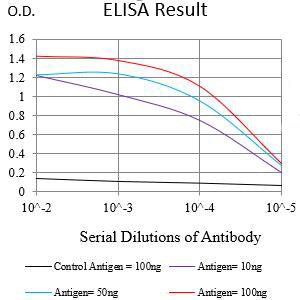
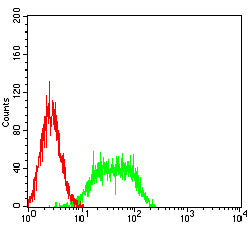
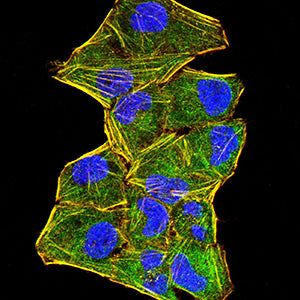
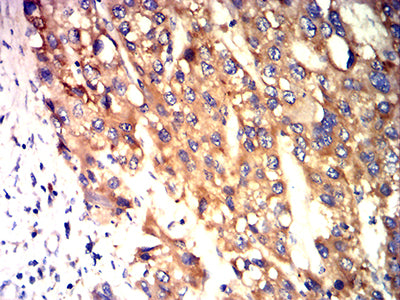
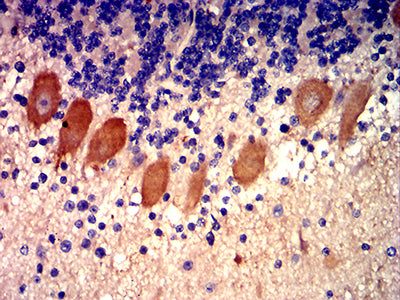
| WB | 咨询技术 | Human,Mouse,Rat |
| IF | 咨询技术 | Human,Mouse,Rat |
| IHC | 1/200 - 1/1000 | Human,Mouse,Rat |
| ICC | 1/200 - 1/1000 | Human,Mouse,Rat |
| FCM | 1/200 - 1/400 | Human,Mouse,Rat |
| Elisa | 1/10000 | Human,Mouse,Rat |
| Aliases | F11R;JAM; KAT; JAM1; JAMA; JCAM; PAM-1 |
| Entrez GeneID | 50848 |
| clone | 3B2B3 |
| WB Predicted band size | 32.6kDa |
| Host/Isotype | Mouse IgG1 |
| Antibody Type | Primary antibody |
| Storage | Store at 4°C short term. Aliquot and store at -20°C long term. Avoid freeze/thaw cycles. |
| Species Reactivity | Human |
| Immunogen | Purified recombinant fragment of human CD321 (AA: extra 28-238) expressed in E. Coli. |
| Formulation | Purified antibody in PBS with 0.05% sodium azide |
+ +
以下是关于CD321(JAM-A)抗体的3篇示例参考文献(注:以下为模拟示例,实际文献需通过学术数据库检索):
1. **文献名称**: "CD321 (JAM-A) Antibody Attenuates Neutrophil Transmigration in Acute Lung Injury Models"
**作者**: Smith A, et al.
**摘要**: 本研究通过体内实验证明,靶向CD321的单克隆抗体可显著抑制中性粒细胞穿过内皮屏障的迁移,减轻脂多糖诱导的小鼠急性肺损伤,提示CD321抗体在炎症性疾病中的治疗潜力。
2. **文献名称**: "Junctional Adhesion Molecule-A (CD321) as a Novel Target in Colorectal Cancer Therapy"
**作者**: Zhang L, et al.
**摘要**: 研究发现CD321在结直肠癌细胞中高表达,其特异性抗体通过阻断Wnt/β-catenin信号通路抑制肿瘤生长和转移,为癌症靶向治疗提供了新策略。
3. **文献名称**: "Role of CD321 in Viral Entry: Mechanistic Insights from Antibody Blockade Studies"
**作者**: Gonzalez R, et al.
**摘要**: 该研究利用CD321中和抗体证实了JAM-A作为部分肠道病毒(如reovirus)的共受体作用,揭示了CD321在病毒入侵宿主细胞过程中的关键分子机制。
---
**提示**:实际文献检索建议使用关键词组合:
"CD321 antibody" OR "JAM-A antibody" + [特定研究方向,如inflammation/cancer/viral infection]
推荐数据库:PubMed/Google Scholar,注意CD321的别称(如F11R、JAM-1)。
**Background of CD321 Antibody**
CD321. also known as Junctional Adhesion Molecule-A (JAM-A), is a transmembrane glycoprotein belonging to the immunoglobulin superfamily. It plays a critical role in maintaining endothelial and epithelial barrier integrity, regulating cell polarization, and facilitating leukocyte transmigration during inflammation. Expressed on endothelial cells, epithelial cells, platelets, and immune cells, CD321 interacts with ligands like integrins (e.g., LFA-1) and other JAM family members to mediate cell-cell adhesion and signaling.
CD321 antibodies are tools used to study its biological functions, particularly in contexts such as vascular permeability, inflammatory diseases, cancer metastasis, and viral pathogenesis (e.g., reovirus entry). Research highlights its dual role: while CD321 supports barrier function under physiological conditions, its dysregulation is linked to pathological states, including atherosclerosis and tumor progression. Antibodies targeting CD321 often block ligand interactions or modulate downstream signaling, aiding in mechanistic studies.
Therapeutic potential is also explored, with CD321 antibodies investigated for modulating immune responses or inhibiting pathogen entry. However, complexities in its signaling networks and tissue-specific roles necessitate further research. Overall, CD321 antibodies remain vital for unraveling its contributions to health and disease.
×